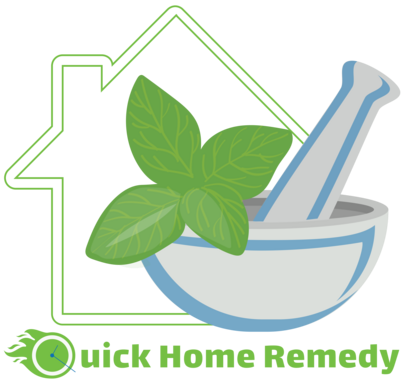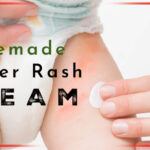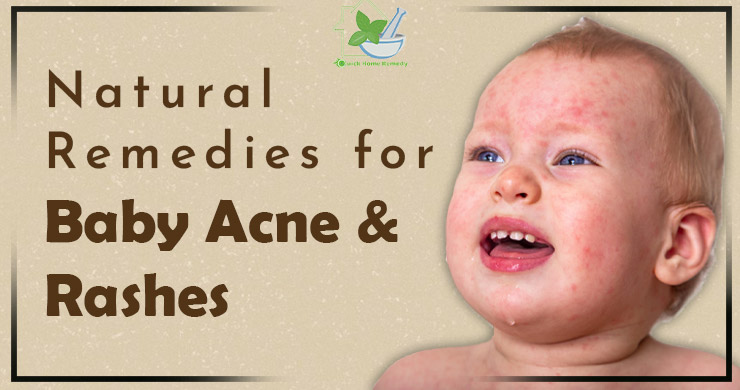
The purpose of this article is to deepen your understanding of concerns that encompass issues such as baby acne, skin rashes, and prickly heat. Additionally, the article aims to provide insights into identifying these problems and exploring natural remedies to address baby acne.
Most mothers are anxious when their infants encounter any type of ailment. Skin issues, in particular, can be deeply concerning and agitating for mothers. Baby acne, skin rashes, prickly heat, and analogous conditions have the potential to cause mild discomfort to your child.
Baby Acne: What is it?
Have you noticed white and red pimples appearing on your baby’s face, forehead, chin, or upper back? These are common baby acne symptoms.
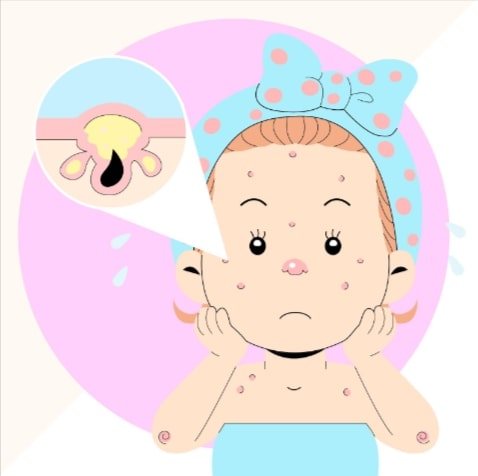
Baby acne, also known as neonatal acne, is a common skin condition that affects newborns and sometimes infants. It typically appears within the first few weeks after birth and is characterized by small red or white bumps on the baby’s face, especially on the cheeks, nose, and forehead. It can resemble teenage acne, but it’s usually milder and temporary.
What causes baby acne?
You might be wondering what the causes of baby acneare at such a tender age.
Acne can be present at birth, but it usually appears after a couple of months. During the final weeks of pregnancy, the mother transfers her hormones to the baby. This stimulation of the baby’s oil glands leads to baby acne. Approximately 40% of babies are affected by this type of acne. Babies have sensitive skin, which can also contribute to severe baby acne.
While the exact cause is not definitively understood, several factors are believed to contribute to its development:
Hormonal Influence: Hormonal changes play a significant role in the development of baby acne. During pregnancy, a mother’s hormones, including androgens, can cross the placenta and affect the baby. After birth, the baby’s own hormonal fluctuations, particularly elevated levels of androgens, can stimulate the oil glands in the skin, leading to the formation of acne.
Immature Oil Glands: Newborns have small and immature oil glands, also known as sebaceous glands, that are more prone to clogging. This can result in the formation of tiny bumps and pimples on the skin’s surface.
Genetics: Genetic predisposition can also play a role in the development of baby acne. If a parent experienced acne during their own infancy, their baby might be more likely to develop it as well.
External Factors: While less common, certain external factors like exposure to harsh skincare products or medications transferred through breastfeeding could potentially contribute to baby acne.
Duration and Treatment Options for Baby Acne

Parents often worry about how long baby acne lasts and how they can get rid of baby acne.
Baby acne doesn’t usually bother the baby, so healthcare professionals generally do not prescribe medication for it. There isn’t much you can do about it except wait patiently for the level of the mother’s hormones in the baby’s body to subside. The acne will naturally disappear over time.
Pediatricians suggest a timeframe of 6 weeks for baby acne to resolve. However, if you still want to take action, opt for home remedies for baby acne.
Keep in mind that every baby’s skin is different, so it’s important to monitor their reaction and discontinue any remedy that seems to worsen the condition or cause irritation. If the baby’s acne persists or worsens, it’s advisable to consult a pediatrician for guidance.
Never attempt to use adult acne treatments on a baby and refrain from rubbing the affected area, it might lead to severe baby acne.
Here are some gentle home remedies that you can try to manage baby acne:
Breast Milk:

Breast milk has natural antimicrobial properties and can help soothe irritated skin. Breast milk not only provides essential nutrition for the baby but also offers potential benefits for treating baby acne. It aids in building the baby’s immune system and contains lauric acid, which has acne-fighting properties.
In addition to nourishing the baby, mother’s milk can effectively treat baby acne. It contains omega-3 fatty acids and Glyconutrients that gently exfoliate the skin, which is crucial for acne treatment.
Therefore, breastfeeding provides numerous advantages, and applying breast milk directly to baby acne can yield remarkable results.
Proper Cleaning:
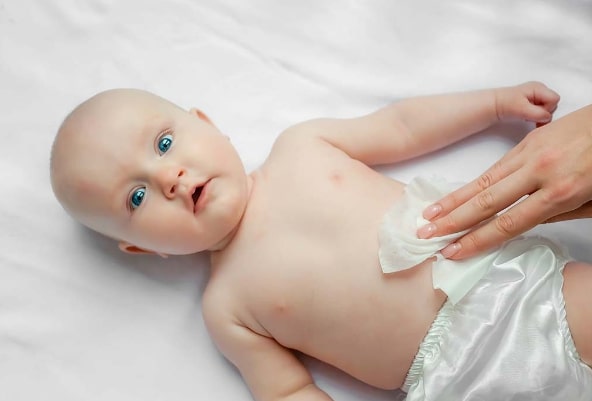
Proper cleaning is of utmost importance when it comes to treating baby acne. Unfortunately, cleaning is often overlooked or underestimated. It is essential to thoroughly clean anything that comes into contact with the baby’s skin. Regular cleaning, along with a careful selection of gentle detergents, is crucial to preventing the exacerbation of the skin condition.
Keep in mind:
To avoid spreading bacteria or dirt to your infant, make sure your hands are clean before touching his or her face.
After the skin has dried, use any natural therapies, such as a thin layer of coconut oil or breast milk. Before clothing the infant, let the remedies air dry.
While keeping the baby’s skin clean is crucial, you should avoid over-cleansing or using too many products because these actions might remove the skin’s natural oils and exacerbate the issue.
Depending on how bad the baby’s acne is, try to wash his or her face once or twice each day. When cleaning, be kind and mindful of your baby’s comfort at all times.
Coconut Oil:
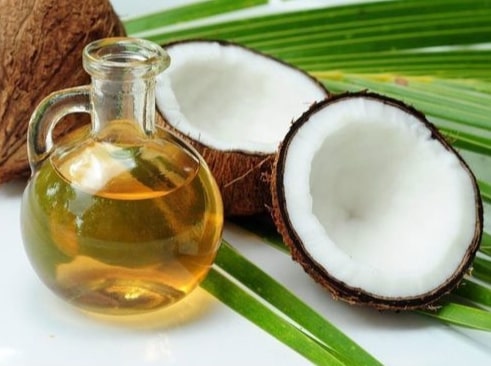
In the Asian subcontinent, coconut oil is widely used for a variety of baby skin treatments. It is frequently referred to as the “bread and butter” solution. Coconut oil provides amazing nutrients for infant acne and is quickly absorbed into the skin. Coconut oil’s wonderful effects on a baby’s skin should not be disregarded. Its inherent antibacterial characteristics aid in the healing of infant acne.
While many parents find coconut oil beneficial, it may not work for every baby, and a patch test on a small area of the baby’s skin is recommended before applying it more broadly.
Here’s how coconut oil might assist with baby acne:
Moisturization: Coconut oil is a natural moisturizer that can help keep the baby’s skin hydrated. Hydrated skin is less likely to become overly dry and irritated, which can contribute to the development of baby acne.
Anti-Inflammatory Effects: Coconut oil contains compounds that have anti-inflammatory properties. These properties could help soothe redness and irritation associated with baby acne.
Antibacterial Properties: Coconut oil contains lauric acid, which has mild antibacterial properties. Applying coconut oil to the affected areas may help prevent bacterial growth and reduce the risk of infection.
Sandalwood Paste:
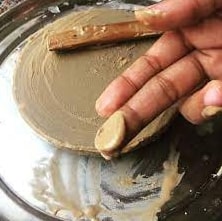
Sandalwood paste is a traditional remedy that has been used for various skin-related issues, including acne, for centuries. However, when it comes to using sandalwood paste for baby acne, caution is advised due to the sensitivity of a baby’s skin. Here’s how sandalwood paste might help and some considerations to keep in mind:
Cooling and Soothing: Sandalwood is known for its cooling and soothing properties. Applying a thin layer of sandalwood paste to the affected areas could provide relief from any itching or discomfort associated with baby acne.
Anti-Inflammatory: Sandalwood contains compounds that have anti-inflammatory properties. These properties could potentially help reduce redness and inflammation associated with baby acne.
Considerations:
Dilution: Sandalwood paste can be quite potent. If you decide to use it, make sure to dilute it with a suitable base like water, rose water, or plain yoghourt to create a milder mixture suitable for a baby’s sensitive skin.
Patch Test: Before applying sandalwood paste to the baby’s skin, it’s essential to conduct a patch test. Apply a small amount of the paste on a small area of the baby’s skin and wait for a day to ensure there’s no adverse reaction.
Consult a Pediatrician: Before using any new remedy on your baby’s skin, especially for a sensitive condition like baby acne, it’s best to consult your pediatrician. They can provide personalized advice based on your baby’s health and skin condition.
Dietary Changes

Dietary changes for managing baby acne are primarily focused on the mother’s diet if she is breastfeeding. It’s important to note that while some mothers believe that certain foods they consume can affect their baby’s skin, scientific evidence supporting a direct link between maternal diet and baby acne is limited. However, a healthy and balanced diet can indirectly contribute to the baby’s overall well-being, including their skin health.
What about rashes?
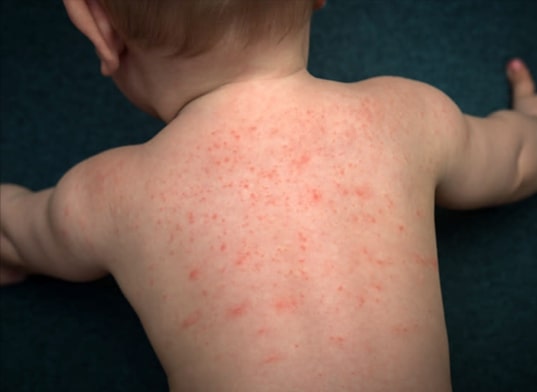
It is usual for babies to develop rashes; however, most rashes are harmless and resolve on their own.
Instead of self-medicating, it is advisable to consult a general practitioner when it comes to your baby’s health. Here are a few dos and don’ts to consider:
One common type of rash you may encounter is diaper rash. It occurs due to wetness, as even the most absorbent diaper leaves moisture. Additionally, the rubbing of the diaper against the skin can lead to a rash. Choosing the right diaper is crucial, opt for one that is made with fewer chemicals.
Keeping your baby’s skin dry is essential. Change wet diapers promptly and allow your baby’s skin to breathe. Give them a few minutes of diaper-free time to feel the air before putting on a new diaper.
When cleaning cloth diapers, use mild soap and ensure thorough rinsing. Avoid using irritating wipes that can be harsh on your baby’s delicate skin. Opt for wipes that do not contain alcohol.
Heat rash, also known as prickly heat, occurs when pores are blocked. It is common in young children, particularly in hot and humid weather. The most effective treatment for heat rash is creating a relaxed and less humid environment. Avoid using powders, as they are ineffective.
Final Thoughts
So, now you have some basic information about baby acne and rashes. Cleanliness plays a crucial role. Use mild products that are gentle on your baby’s skin to prevent irritation and the worsening of the condition. Paying attention to these small details can keep your baby comfortable, and consulting a doctor will provide valuable advice on how to manage rashes or baby acne effectively.
